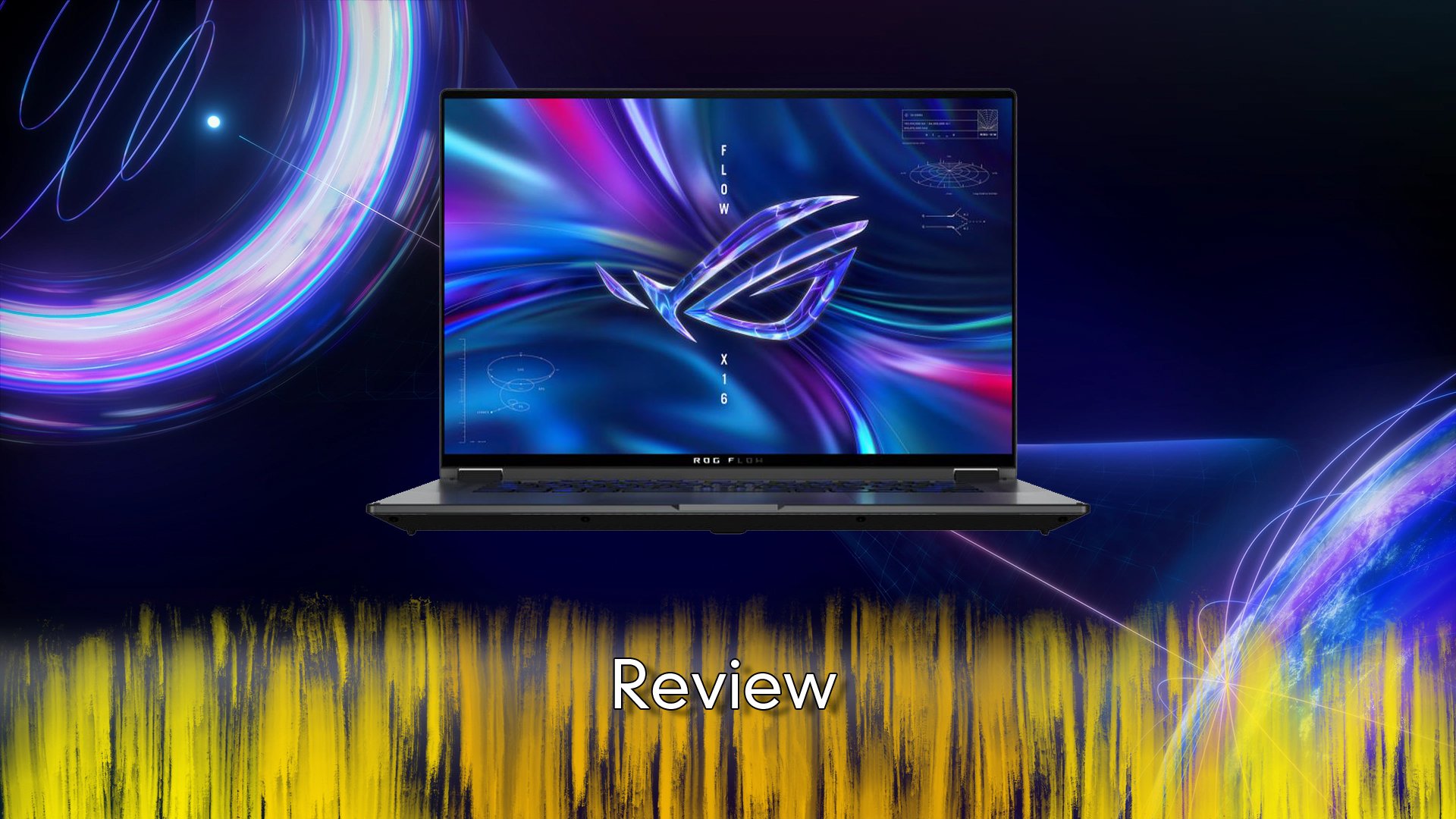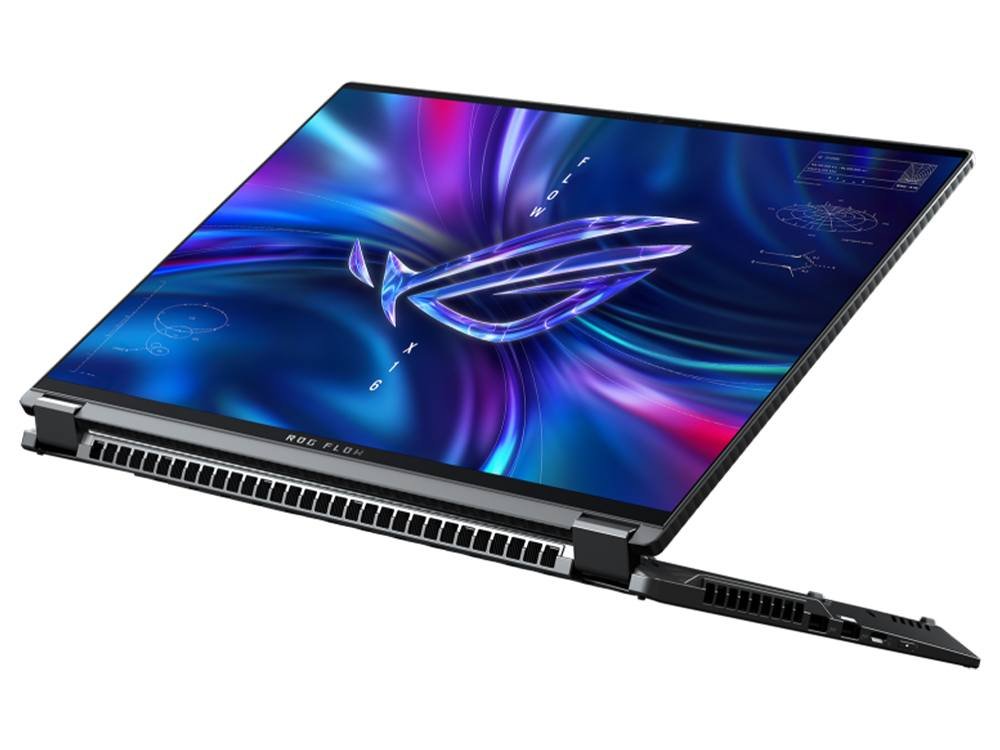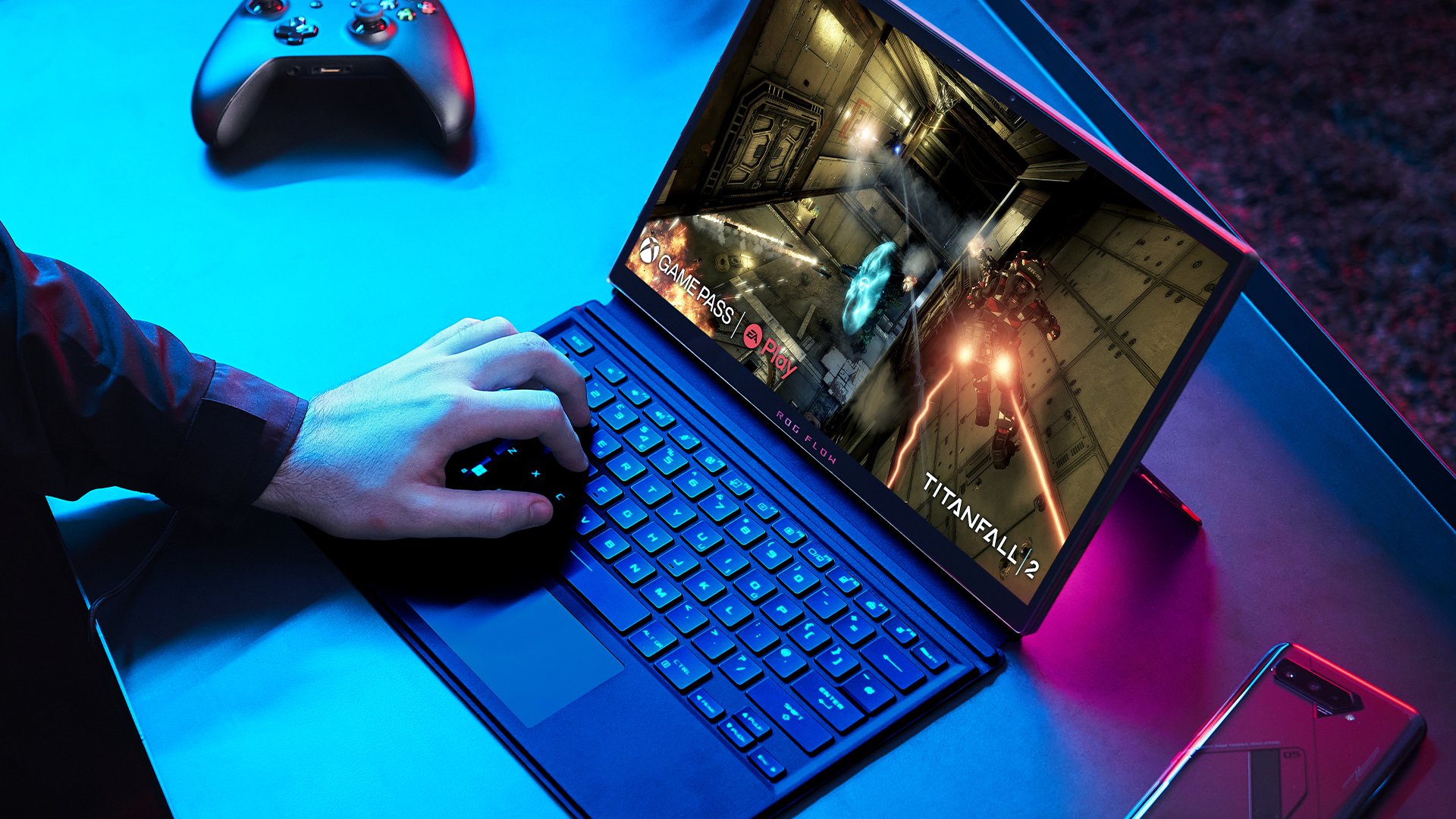ASUS ROG Flow X16 - Review

The ASUS ROG Flow X16 is an innovative 2-in-1 gaming laptop, that aims to push further the expectations of the gaming market and create its own niche in the ever growing sector.
Straight out of the box, the ASUS ROG Flow X16 is an impressive machine. A textured feeling body, that doesn’t feel excessively thick or weighty in the hand, the machine within is even more impressive. Interestingly, unlike many of the modern day laptops, instead of having a keyboard button dedicated to turning the unit on, the ROG Flow has gone with a dedicated button on the side of the machine, with a small LED to indicate whether or not it is currently booting or not. It was this slight difference that instantly had me looking for anything more.
A lot of 2-in-1 laptops seem to forsake image quality or size for the sake of having a seemingly more practical touch screen aspect. The ROG Flow X16 however has an incredibly clear and high quality display. It cannot be understated how nice the screen is to look at, a screen far more similar in appearance to a high-end drawing tablet than that of a standard laptop. Using the Gorilla Glass 3, the 16” inch touchscreen display maintains this level of quality despite any level of touch and play, which is incredibly reassuring for the long term. Alongside this sits the Nebula HDR engine, which is an in-house backlight algorithm by ROG themselves which allows for adaptive control. Dynamic dimming and boosting results in less blooming effect and an increased vibrancy. Which even from just the desktop is easily visible. There is even more going on beneath the surface here with different technologies and colour systems, but what it all amounts to is an incredibly crisp, clear and high fidelity display, which makes long sessions of gaming and movie watching a much more enjoyable experience.
Possibly the most impressive part is how hard the ROG Flow X16 can be pushed. Up to 64gb of DDR5 memory, an incredibly powerful system driven by the Ryzen 9 series of CPUs, as well as 3000 series GPUs, the laptop is going to keep on going with the modern day systems. You’ll be able to run most games at a relatively high graphics quality without issue, and surprisingly whilst the unit does indeed get pretty hot as is the case with laptops; it doesn’t get skin scaldingly hot too quickly. The fans themselves run far quieter than a lot of high end gaming systems. Even when they kick into turbo levels to cool the system down really rapidly, they are not louder than that of a desktop unit or a standing swivel fan. This means that longer sessions of use won’t have you playing hot potato with the laptop if it is sitting on your legs as well as not sacrificing quality of your games for the sake of keeping it quieter.
The touchscreen aspect of the Flow X16 is perhaps one of the more impressive executions of the 2-in-1 laptop style, that is currently available on the market. Flow is an appropriate description for the almost liquid like conversion of the laptop to its tablet form. With in-built stylus support, that even users who are perhaps the most lacking in artistic talent, should get good use out of it (I am speaking from experience). All that means is that for those artists, there is no reason to choose between getting a dedicated gaming laptop or one made for drawing. The system also allows for direct connection to wireless gaming controllers, like that of the Xbox Series X|S family or the DualSense from PlayStation. This removes a potential barrier and means that if you want to game on the go, all you need is a controller and the laptop will take care of the rest. You can game with it in the traditional laptop form, but flip the screen back, and you’ve got a 16” screen to display whatever game you want.
It may be a result of the internal design that allows for this quieter cooling system, but it does mean that the DC jack is on the left hand side of the laptop. This odd placement means that you’ll likely run into situations where you have to run the power cord around the back of the laptop to then plug it in. For some unfathomable reason, it was decided to make the plug to the power pack the longer cable, rather than the cable from the power pack. For me this meant that I often had to battle with the unwieldy and oversized powerpack and finding a place for it to sit it when using the laptop on charge. In the modern day, rear entry DC inputs should the go to design. If this is a decision to fit in the more powerful internals, I can understand it, but I would take a slightly bulkier unit if it meant that the charging port is in a far more practical location.
Something else of note is that it seems that the idea of 2x USB-A and 1x USB-C has become the standard with most laptops. The inclusion of ready to go wireless controller connectivity assists here, removing one potential port blocker and with a keyboard that feel responsive, an external option shouldn’t be required. What it does mean though is that your use of cables will need to be regulated quite regularly, in order to ensure you don’t run out of the port you need. Thankfully the laptop can be ordered with up to 2TB of on-board storage, which means the need for external storage is moot. The exceptionally large trackpad feels noticeably different from the textured body, thanks to its smooth design, which in turn allows for a pretty decent use. Ideally you’ll only really ever need to plug in a mouse and maybe a USB set of headphones, so you’ll likely have a spare Type-C port to use for a charging cable or other form of specialised hardware. Something that faded away for a while but is making a comeback is the inclusion of a SD card reader, which is a welcome inclusion. All these connection options, including the stylus support, means that people using the system for both pleasure and business to get full use out of it.
All in all, the ASUS ROG Flow X16 is an impressive 2-in-1 Gaming Laptop. A high fidelity screen, with a lot going on in the background allows for superior quality gameplay, as well as secondary business uses. Powerful specs means you’ll be unlikely in needing to upgrade for the foreseeable future, and with the Gorilla Glass, it’ll maintain the screen quality for just as long as you need it to. An incredibly smooth transition from laptop to tablet style means you can quickly change to what you need the system for, when you need it on the go. An incredible system that is definitely one worth investing in.
The Score
9.0
Review unit provided by ASUS
The Pros
+Smooth mode of use transition
+Runs pretty quietly and not too hot
+High quality screen
The Cons
-Poor DC jack placement
-DC powerpack is designed poorly and a running trend in the industry









